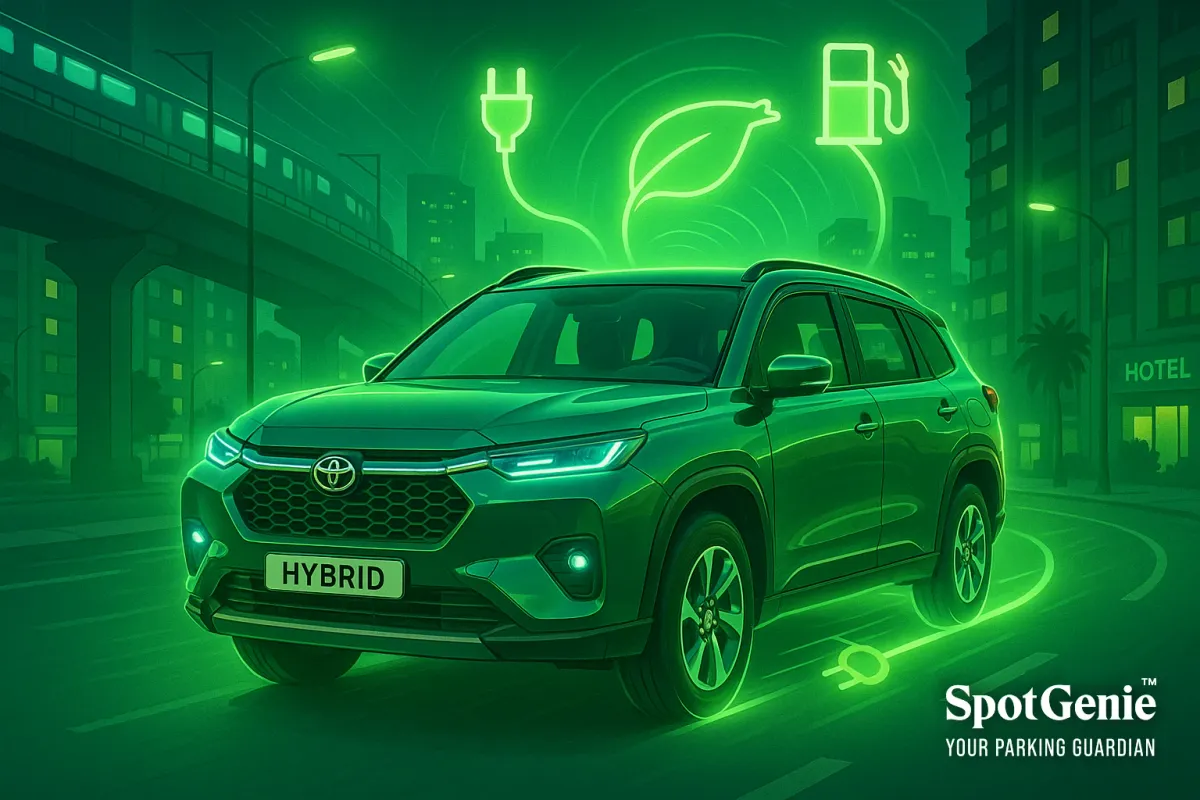Hybrid Cars in India 2025: Types, Benefits, Costs & Top Models
Hybrid cars are bridging the gap between petrol and EVs in India. Offering higher mileage, lower emissions, and advanced tech, hybrids are gaining traction in 2025. Here’s a detailed guide on how they work, their types, benefits, and the best hybrid cars in India.

SpotGenie Gyaan: Hybrid Cars in India 2025 – Complete Guide
India’s auto market is evolving rapidly. On one side, petrol and diesel cars still dominate sales; on the other, EVs are rising fast. Sitting right in the middle are hybrid cars, offering the familiarity of petrol with the efficiency of electric motors.
In 2025, hybrids are no longer rare. Models like the Toyota Urban Cruiser Hyryder, Maruti Grand Vitara, and Honda City e:HEV have brought hybrids into the mainstream. But what exactly is a hybrid, and why are Indian buyers considering them more seriously?
Let’s unpack everything you need to know.
What is a Hybrid Car?
A hybrid car uses two power sources:
- An internal combustion engine (ICE) – usually petrol.
- An electric motor + battery pack.
The system smartly switches or combines power to improve fuel efficiency, reduce emissions, and sometimes even allow pure electric driving for short distances.
Unlike EVs, hybrids don’t rely on external charging (except plug-in hybrids). The car itself charges the battery through regenerative braking and engine power.
Types of Hybrid Cars
Not all hybrids are the same. Here are the key types:
1. Mild Hybrid
- Small electric motor assists the petrol engine.
- Doesn’t drive the car independently.
- Improves mileage & reduces emissions slightly.
- Examples: Maruti’s SHVS tech in Ciaz, Baleno.
2. Strong/Full Hybrid
- Bigger motor + battery.
- Can run on engine, motor, or both.
- Offers significant fuel savings.
- Examples: Toyota Hyryder Hybrid, Maruti Grand Vitara Hybrid, Honda City e:HEV.
3. Plug-In Hybrid (PHEV)
- Can be charged externally like an EV.
- Runs longer on electric-only mode.
- Rare in India right now due to cost and charging infra.
- Example: Internationally – Toyota Prius PHEV, Volvo XC90 Recharge.
Benefits of Hybrid Cars in India
- Fuel Savings → Strong hybrids deliver 20–28 km/l in real-world conditions.
- Lower Emissions → Reduced CO2 vs pure petrol.
- No Range Anxiety → Unlike EVs, hybrids don’t depend on charging infra.
- City-Friendly → Electric-only mode in traffic improves efficiency.
- Government Push → Lower GST (5% for hybrids vs 28% on regular petrol/diesel cars) has been under discussion, though not fully implemented yet.
Challenges of Hybrids
- Higher Upfront Cost → Strong hybrids cost ₹2–3 lakh more than petrol versions.
- Battery Replacement → Though warranties cover 8 years/160,000 km, eventual replacement is costly.
- Limited Choice → Only a handful of strong hybrid models in India.
- Policy Uncertainty → EVs are getting stronger government support; hybrids get less focus.
Popular Hybrid Cars in India (2025)
Here are some of the top-selling hybrid cars in India (validated 2025 models):
-
Toyota Urban Cruiser Hyryder Hybrid
- Price: ₹16–20 lakh
- Mileage: ~27 km/l
- Compact SUV with strong hybrid tech.
-
Maruti Suzuki Grand Vitara Hybrid
- Price: ₹16–19.5 lakh
- Mileage: ~27 km/l
- Shares Toyota’s hybrid system; very popular in metro cities.
-
Honda City e:HEV
- Price: ₹19–20 lakh
- Mileage: ~25 km/l
- Sedan buyers’ hybrid option; refined and efficient.
-
Toyota Innova Hycross Hybrid
- Price: ₹25–30 lakh
- Mileage: ~21 km/l
- Strong hybrid MPV; combines comfort with efficiency.
Hybrid Cars vs EVs vs Petrol
- Cost: Hybrids are costlier than petrol but cheaper than most EVs.
- Running Cost: EVs win (₹1/km), hybrids are ~₹4–5/km, petrol ~₹7–9/km.
- Convenience: Hybrids don’t need charging infra → practical in 2025 India.
- Eco Impact: EVs are cleanest (if charged with renewables), but hybrids are greener than petrol/diesel.
SpotGenie
With vehicles growing in Indian cities, parking issues remain universal. Whether you drive a petrol, EV, or hybrid, finding safe parking and handling emergencies is tough.
SpotGenie’s QR-powered alert system helps hybrid car owners:
- Get WhatsApp alerts if their parked car is blocking someone.
- Stay informed if towing or emergencies occur.
- Avoid sharing personal numbers for safety.
In short, hybrids save fuel, SpotGenie saves peace of mind.
FAQs
Q1. Are hybrid cars worth buying in India in 2025?
A1. Yes, if you want fuel efficiency and eco benefits without relying on charging infrastructure.
Q2. Which is the best hybrid car in India in 2025?
A2. Toyota Hyryder and Maruti Grand Vitara are top picks for SUVs; Honda City e:HEV for sedans.
Q3. Do hybrids need charging?
A3. Mild and strong hybrids don’t. Only plug-in hybrids (PHEVs) need external charging.
Q4. What is the mileage of hybrid cars in India?
A4. Strong hybrids deliver ~20–28 km/l in real-world driving.
Q5. How long do hybrid batteries last?
A5. Typically 8–10 years, with warranties covering up to 8 years/160,000 km.
Final Word
Hybrid cars are the perfect bridge for India in 2025, combining the practicality of petrol with the efficiency of electric. While EVs are the future, hybrids offer a realistic solution today for those who want lower running costs without worrying about charging.
And with SpotGenie, hybrid owners get a smarter, safer way to handle parking in crowded Indian cities.
Follow us on:
🅾 Instagram |
ⓕ Facebook |
𝕏 X |
▶️ YouTube |
🟢 WhatsApp



